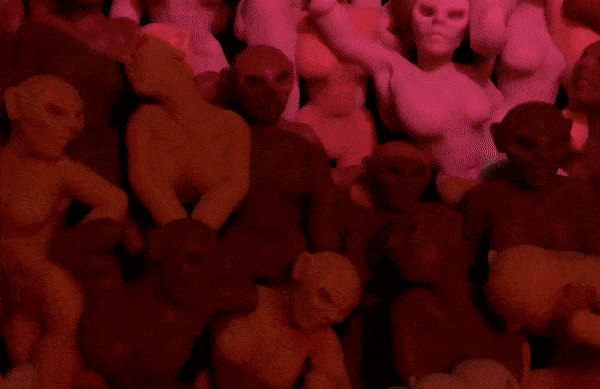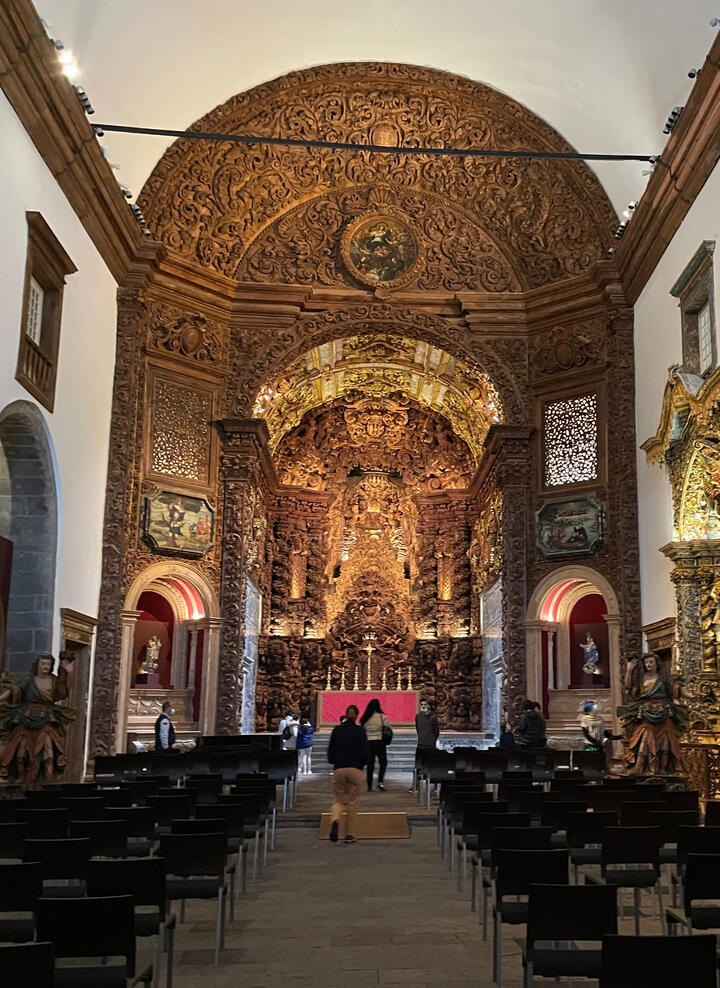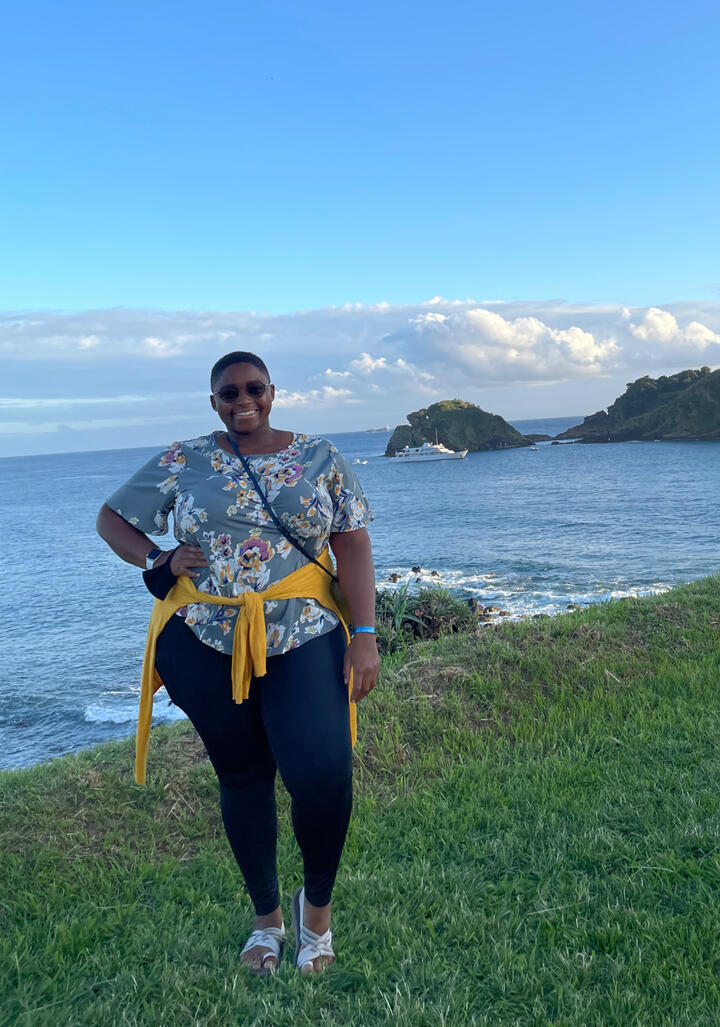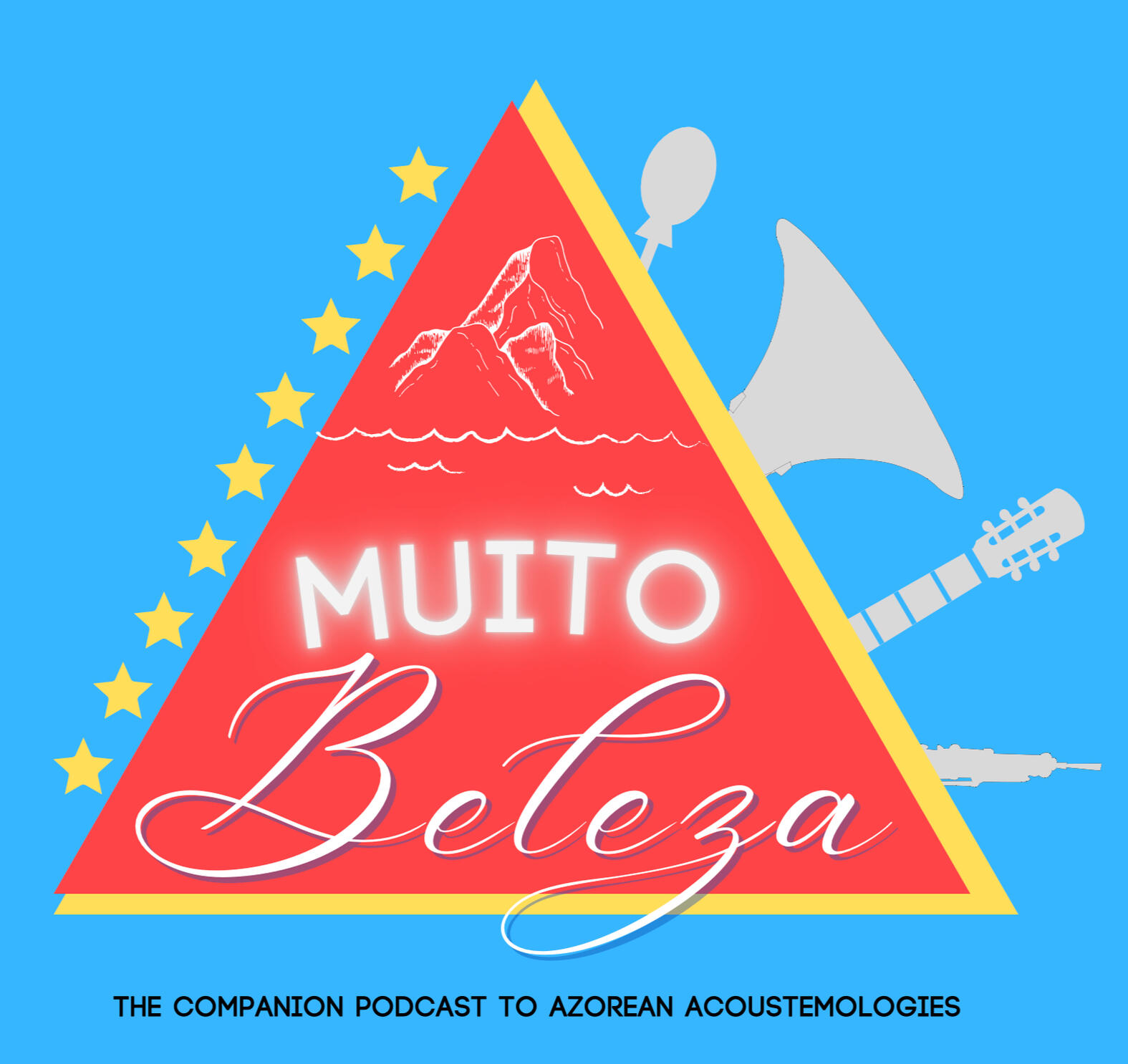Azorean Acoustemologies
An Ongoing Sonic Ethnographic Research Project by Abigail Lindo (em português)
origins
This site is structured in relation to my dissertation (of the same name) and will be updated following its completion. Each page represents a different section of the dissertation and will be updated monthly to house information specific to the facet of research being described.
approach
I will understand the structure and malleability of Azorean sonic culture using diverse qualitative methods, including participant observation, interviews, surveys, and phenomenological musical analysis. Information will be analyzed using a feminist ethnographic lens.
audience
This labor, which begins in São Miguel (the largest of nine Azorean islands) and focuses on the capital of Ponta Delgada, will encompass other islands following the dissertation period and will be beneficial to music academics, students at partnering universities, Azorean residents, and others interested in music and culture in the general public.More...
application
The resulting data from fieldwork periods will be accessible on this website (which is open to the public), compositions, video journals, a lecture-performance, and in my dissertation. Following the completion of the dissertation, the website will be reformatted to include ongoing research.
echoes
This chapter is about echoes.
It is about forefathers and mothers and the former colonizers and the formerly colonized.
It is about how their memories linger in the spaces of the island.
These echoes are also in the churches.
These echoes move beyond their white walls and forest green doors.
These echoes curve along the dark lava rock ornamentations on corners and steeples –
along the open spaces with ornate wood or metal carvings and tile:Can you see it?(this chapter is about traditions, their perpetuity, and their outcomes)
LAND/ings: vignette i
1. Flow: Liquidity and Black Sonic Aesthetics
coming soon
- 1. Flow: Liquidity and Black Sonic Aesthetics
- 2. Lorde's Erotic and Trans-Fem Post-Colonial Expression
- 3. Queering the Heteroperformative Geography
LAND/ings: vignette ii
2. Lorde's Erotic & Trans-Fem Post-Colonial Expression
In a hidden corner of Coliseu Micaelense in Ponta Delgada, to the right of the majestic performance hall, there is a room with cream walls. It is accessible through a narrow internal hallway and a side door leading to an empty parking lot. During Tremor 2021, this room was home to an installation called “Scabra Makaron Nesoi” by Brazilian DJ and creative Slim Soledad and Portuguese freelance visual artist Débora Silva (see figure 3). It was a treatment that transcended the limits of the room’s humble walls.

The screens that lined the walls presented images of a queer body, a feminine trans body in the natural landscape, and of 3D printed figures among organic and inorganic materials, with flashing lights and contrasting colors to produce a sense of movement and depth. The idea resonates: producing something queer, channeling a counterculture to the religious imagery of the region, and unsettling the normalcy of hegemonic sexual performance through looping sound and visuals that confronted visitors as they moved through patches of bright pink light in the dimly lit room.

The installation as a consumable for the eyes, ears, and minds of visitors is a vivid demonstration of agency by Silva and Soledad. By erotic, I refer to the Lordean form of power that is driven by recognizing and finding strength in the truth of self and using that strength to confront oppression and cultivate pleasure. This erotic is a reclamation of the term, deviating from the pornographic or masculine serving functions it has been assigned over time. The power in the erotic can manifest from sharing and feeling deeply, and in fearlessly owning joy and pleasure. It is a personal experience. It is an intimate experience.
Soledad’s trans womanhood, on display in bodily presence, visual image, and sonic resonance, transforms the meaning of her visage, putting herself on display with images in the natural landscape signaling origin and belonging. She is reclaiming the land in her Black body. She is reclaiming the land in her feminine body. She is fearlessly celebrating who she is and it is on display, in a space where others can intimately engage. They can draw closer to her image. They can listen to the sounds she produced, repeating in the air around them. She can envelop them in thought. If even for a moment. They can share the erotic.
- 1. Flow: Liquidity and Black Sonic Aesthetics
- 2. Lorde's Erotic and Trans Female Post-Colonial Expression
- 3. Queering the Heteroperformative Geography
LAND/ings: vignette iii
3. Queering the Metropole and Rural Geography
coming soon
- 1. Flow: Liquidity and Black Sonic Aesthetics
- 2. Lorde's Erotic and Trans-Fem Post-Colonial Expression
- 3. Queering the Heteroperformative Geography
distance
This chapter is about distance
It is about bodies occupying space
and the geography mapped by their existence
and the sounds produced as they make meaning in these spaces. This chapter considers titles or identities
imprinted on or assumed of bodies based on spatiality,
namely native, tourist, and foreigner,
reflecting on how these titles predicate specific behaviors
in spaces of sonic exchange or musicking.
Individuals in these spaces
fashion self using a wealth of affective expressions,
including dancing, bodily gestures, and vocalizations,
employed at varying degrees throughout engagement
with musical stimuli, other sounds, and other individuals in a performance space.(click the site title to visit the "distance" visual essay)
silence
This chapter is about silence
(how it breathes throughout the city streets each night,
even as the bread man drives his truck through the narrow roads
caressed by towering buildings that allude to the history of the space,
washed by the salt floating in the air from the sea whistling nearby.
This silence speaks to the divide between the natural landscape and the human-made city spaces,
with limited noise pollution reflecting reverence for the natural in unnatural spaces.
This is also the silence of the taxidermy in the Museu de Carlos Machado.More information and media coming soon
LAND/ings
floating
This chapter is about floating.
It is about water and islands, about waves crashing, colliding, and blending with one another -
collectively part of a whole - bridging contents, supporting life, sounding as chaos and peace
for meditation in its repetition without beginning or end -
this is the flow of identity and globalized bodies making meaning in new terrains they transform through their being.
How does this sound?
This chapter is also about the other parts of São Miguel,
the other islands in the Azores (of things to come),
and the other means of identity-making in these Portuguese territories
(where bodies mirror the land).More information and media coming soon
f.a.q.
Q: What is this research project about?
A: Focused on intangible Portuguese cultural heritage, I will complete an ethnographic research project on the contemporary musical culture driven by music festivals on São Miguel, the largest of nine islands in the Portuguese autonomous region of the Azores. Through attendance of secular and religious music festivals, interviews, participant observation, sound recordings, phenomenological musical analysis, and instruction on the viola da terra (a native stringed instrument) I will develop an understanding of the structure and malleability of the sonic culture of Ponta Delgada, the Azorean capital (located on São Miguel) and surrounding areas. I posit that recent ecotouristic musical events in and around Ponta Delgada, the capital city of the Azores located on São Miguel, aid in developing a distinct and modern sonic identity benefitting the city in its bid to be named a European Capital of Culture in 2027.I additionally consider the sonic culture on the island as an amalgamation of natural sounds occurring in and from the environment and humanmade sounds and music, analyzing these sounds (and the interactions occurring through their creation and consumption) using a feminist ethnomusicological lens centered on experiences of women and queer practitioners and attendees. A feminist approach recognizes the often-androcentric nature of environmentalism and ethnographic research, acknowledging intersectional identities to address oppression, systems of power, and gendered behavior in sonic engagement. Furthermore, incorporating and the work of several prominent Black feminist and gender studies scholars in connection to discussions on affective politics of musical engagement supports the labor of this project with a focus on human geography, difference, agency, and temporality. Their perspectives cement my ideation of postcolonial futures on an island, considering the value of sounding and silence as byproducts of empires past, and assist in framing my own inclusion in the work as an ethnographer.Q: Why are you completing it?
A: While this research project is satisfying requirements for my current dissertation project (with a projected completion of 2025), this topic came to me in a sequence of research interests. I initially considered Portugal because I was fascinated with the concept of saudade and considered how sonic mourning is engrained in collective memory and cultural performance. A former colleague is from the Azores and as I briefly researched the region online, I learned about the Tremor Music Festival and was fascinated by the wealth of cultural events occurring on São Miguel and Terceira. I visited in 2021 for the festival and have been fixated ever since, recognizing something distinct but familiar about the island and musical culture I glimpsed. I recalled how my colleague and I talked about traditional music from the Azores and considered how musical tastes evolve, how individuals perform identity and form connections through musical engagement, and how the festivals, religious events, and other musical practices were Portuguese but distinctly Azorean - something residents will happily confirm. So, I am completing this work because I am deeply interested in it and believe the themes I am focusing on apply to musical engagement outside of Portugal.Q: What does "acoustemology" mean and why are you using it?
A: Acoustemology is a portmanteau of acoustic and epistemology. It was coined by ethnomusicologist Steven Feld in 1992 and can be described as “local conditions of acoustic sensation, knowledge, and imagination embodied in the culturally particular sense of place” (Feld 1996, 91). Feld initially used the term with consideration of attitudes toward forms and categorical assignments, challenging them, and thinking of how they were experienced. He references his prior research with Bosavi songs to elaborate on the concept, specifically addressing how the Bosavi understand bird songs as a mode of communication for different aspects of life in the forest as well as representations of absence. The sound provides a way of knowing things that can be seen and unseen, an understanding of objects and ideas. The term is also active, as something individuals can produce (sounding through knowing and as knowing) rather than just passively knowing or actively understanding how things can be known through sounding.This sense of place is bound to our perception of cultural knowledge within a specific space, but what methods should be used to interrogate sound with this knowledge while consolidating our own cultural and geographical knowledge? In thinking through sound and using sound as a way to understand a space and its functions for the people within it, I utilize it in the context of my research as it is described above to consider sound as historical record, recognizing how the physicality of sound can signal diverse veins of experience. Sound objects communicate cultural knowledge and change over time, complicated by the use of language, globalization, and aesthetic decisions/functions. In my work, these sounds come in the form of musical performances, instrumental sounds, city sounds, and the sonic landscapes of the natural environment.Q: Which individuals are you researching specifically?
A: I do not have a specific demographic (relative to age, race, or social class), but I will be focusing on adults on the island that I encounter during my fieldwork tenure who frequent musical spaces, like the music festivals and religious events I will discuss. Since my work is especially focused on the experiences of women and queer participants and practitioners, I will aim to foster connections with individuals who identify with these groups and celebrate their experiences in musical engagement. Furthermore, during my tenure, I will be working with Dr. Maria Leonor Sampaio da Silva at the University of the Azores to lead a lecture series during the Spring 2023 semester and to complete a survey of music preferences among university students.Q: When will this research be complete?
A: I am currently completing fieldwork in São Miguel with funding from a Fulbright US Student Fellowship and will complete my tenure in June 2023 (unless other funds are received enabling me to remain in the region for the summer). I will use the data attained during this time to complete my dissertation in 2025. This will mark the completion of the first phase of the project. Following this, I intend to return to the Azores during the summer of every year, visiting a different island each time and documenting the musical culture following a period of virtual fieldwork in the US to prepare for each trip. The entirety of this project should be completed by 2035.Q: How will your work benefit the people of the Azores?
A: During my fieldwork on the island, I can directly benefit the communities I interact with by being involved with the cultural events taking place and benefit local business I mention and interact with by patronizing and promoting them. Following my departure, my work will be accessible to research collaborators through this website and the various media items I create using recordings (audio and video) from the region. Their access ensures transparency and holds me accountable as a researcher. In maintaining ongoing relationships with collaborators, I will continue to foster symbiotic relationships with individuals and institutions (like the University of the Azores) to ensure that I can serve the region beyond my tenure.Q: Who are you?
A: My name is Abigail Lindo and I am a PhD candidate in ethnomusicology completed my degree at the University of Florida in Gainesville, FL USA. When I am not completing research on the Azores, I study African American sonic expression, Black popular music cultures, Jamaican dancehall and gender performance, community music movements in the US, music and identity formation, and other related topics that spark my interest and seem worthy of exploration. Before returning to graduate school to complete my PhD, I was a K-12 music educator in Southwest Florida for over 6 years, leading choral and instrumental ensembles while providing numerous opportunities for student enrichment. I am a classically trained mezzo-soprano vocalist and multi-instrumentalist. To learn more about me, visit abigaillindo.com. Q: How can I get in contact with you about information on the project?
A: I am available via email (using the icon above) and you can use Calendly for one-on-one virtual meetings (see the calendar link above).
about the project
This ethnographic research project explores the cultural and sonic lives of people and the environment in São Miguel, the largest island in the Portuguese autonomous region of the Azores. Sonic lives refers to music and all sounds in the environment of the island: sounds that are constant, found in voices, on land and sea, and in metropolitan and rural areas: the sounds that create the memory of a place. This work is guided by the idea that São Miguel, and the Azores more generally, possess distinct and identifiable sonic indicators of Portuguese connectedness while fostering their own sonic identity that is worthy of study. Data will be collected through collaboration with scholars and locals, using interviews and observation, participant-observation, and documenting interactions in musical gatherings as catalysts for identity formation (and how this acts as an impetus for cultural connectivity). Following this research period (and the completion of my degree), I will return to the Azores to visit the other islands and complete a similar research project to give attention to each island.

about me

Hello! My name is Abigail Lindo and I am a PhD candidate in ethnomusicology at the University of Florida in Gainesville, FL. I am a Jamaican-born, African American vocalist, musician, educator, and researcher whose work has been presented in the US and internationally. This research project will be completed in the Azores (specifically in São Miguel) over the course of an 8-to-10-month period where I will be residing in Ponta Delgada, learning the viola da terra, collaborating with researchers at the University of the Azores, keeping sound journals throughout the island, attending music festivals and events, and generally collaborating with locals as I respectfully learn about the culture and sonic sensations of the island. My visit is funded by the University of Florida, the Fulbright Commission of Portugal, and the Institute of International Education, and my resulting ethnographic work will satisfy requirements for my dissertation and the completion of my PhD studies. When I am not researching Portuguese popular music consumption and festival culture, I research African American sonic expression and identity, Jamaican popular music & gender dynamics, gender & feminist studies, and the politics of community music-making. For more information about me, click here.
Azorean Acoustemologies
An Ongoing Sonic Ethnographic Research Project by Abigail Lindo (em português)
Azorean Acoustemologies presents...

coming soon...
Azorean Acoustemologies
Dissertation Media
Video Clip 1: Excerpts of Traditional Azorean Musical Practices Each video clip names the artist(s) and describes them (often including their location of performance). This video is referenced on pages 46, 86, and 101-2 of the dissertation and presents a glimpse into the different approaches to traditional music making that normally occur in (and around) Ponta Delgada.
Video Clip 2: Solo and Collective Viola da Terra Performance Excerpts Each clip in the video above names the artist(s) and describes them (often including their location of performance). This video is referenced on page 59 of the dissertation and presents a glimpse into the different approaches to traditional music making that normally occur in (and around) Ponta Delgada.
Video Clip 1: Excerpts from Tremor 2021 and 2022 These brief excerpts are presented to give an understanding of the diversity of settings, environments, performance genres, and artists selected to participate in Tremor annually. Each performance clip names the artist(s) and describes them (often including their location of origin). This video is referenced on page 114 of the dissertation.
Video Clip 2: ECoC Promotional Images in Downtown Ponta Delgada The video above features images of banners and sandwich boards displayed around downtown Ponta Delgada in the fall of 2022 for the European Capital of Culture (ECoC) competition. The Azores were competing, both as a collective region and with a focus on Ponta Delgada as the actual capital. This video is mentioned on page 114 of the dissertation.
Video Clip 2: Multimedia Experiential Reenactment The featured audio is a mixture of looping outdoor sounds taken from the included videos and others around the performance venue, along with videos spanning the walk from Teatro Micaelense to the Tremor 2023 venue created in Portas do Mar. This video is mentioned on page 184 of the dissertation and is meant to accompany a description of the journey provided in the text.
The videos uploaded here do not present the full quality of the original video recordings as these files are compressed to save online file storage space.